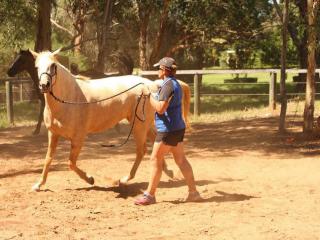Western Australian horse owners and handlers are reminded to be aware of the risk of Hendra virus and to take steps to protect their horses and human health.
Hendra virus is a fatal disease of horses caused by horse contact with the secretions of flying foxes (fruit bats) that carry the virus.
People who have close contact with infected horses, including veterinary staff, may also contract the disease.
Department of Primary Industries and Regional Development animal health surveillance manager Marion Seymour said the risk of Hendra virus occurring in Western Australia was low, but it was important to remain vigilant for the signs of the disease.
“Hendra virus has never been diagnosed in horses in WA, however flying foxes in northern WA have been found to carry the virus and so have the potential to infect horses,” Dr Seymour said.
“Hendra virus most often occurs in winter and New South Wales recently had a case in the Hunter Valley, the furthest south that the disease has occurred to date.
“With regular movements of horses back and forth across Australia for equestrian events, horses can also be exposed to other horses incubating the disease.”
Dr Seymour said there were several steps horse owners could take to reduce the risk of Hendra virus occurring.
“Wherever possible, minimise horse and flying fox contact,” she said.
“Try to keep horses out of paddocks where flying foxes are present, particularly when trees are flowering and fruiting, and remove fruit debris. If this is not possible, fence off trees where flying foxes roost so that the horses do not have contact with the bat secretions.
“Ensure any feed and water is kept in a covered area to avoid exposure to bat secretions.
“If your horse has contact with horses from Queensland and New South Wales, speak to your vet about whether your horse should be vaccinated in order to protect its health as well as the health of its handlers.
“And remember that regular boosters are required.”
Dr Seymour said Hendra virus in horses could present in a number of ways, but in most cases the illness comes on rapidly and the horse deteriorates quickly.
“Other key signs to be aware of are a fever and rapid heart rate, dullness, laboured breathing, nasal discharge and neurological signs such as wobbly gait, lack of coordination, apparent blindness, aimless walking, head tilting, muscle twitching, urinary incontinence and inability to get up,” she said.
“If you suspect Hendra virus, call your vet or the Emergency Animal Disease hotline 1800 675 888 immediately, isolate the horse and minimise contact until the disease has been ruled out.”
More information about Hendra virus in horses is available here.
People who have been in contact with a horse suspected to have Hendra virus should immediately contact their doctor for advice.

Media contacts:
Jodie Thomson/Lisa Bertram, media liaison +61 (0)8 9368 3937
